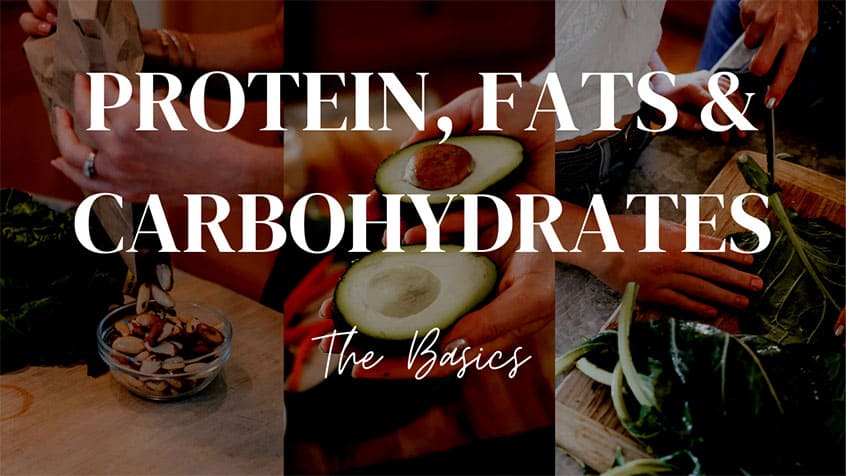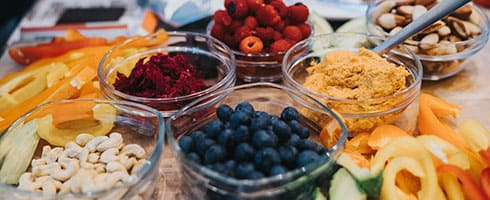In our diet, there are two basic types of nutrients our bodies need to survive and thrive: macronutrients (those we need in larger amounts) and micronutrients (those we need in smaller amounts and what the macronutrients break down into). Protein, fats, and carbohydrates are considered macronutrients while vitamins and minerals are considered micronutrients.
Protein, fat, and carbohydrates help provide our body with the nourishment it needs to function and the energy it needs to survive. Every cell and organ in your body relies on the adequate daily intake of each of these macronutrients to thrive. However, no one’s adequate intake is the same which is why it is so important to learn what your body needs and listen to the cues that something is off.
Focusing on the right amounts of fresh organic whole food sources for protein, fat and carbohydrates will ensure you body has the fuel to give you adequate energy, maintain a healthy weight, support a strong immune system, lower inflammation, stabilize mood, keep hormones in balance and protect your body from disease.
Why do we need protein?
Every human cell contains protein. Protein helps our body with repair of cells and tissue. It is an important building block for bones, muscles, cartilage and skin. It also helps with hormone regulation, producing enzymes to help with digestion, immune system function, energy production when blood sugar is low and transports nutrients.
Eating a high protein breakfast can help with low energy and overeating later in the day. Protein helps to keeps blood sugar balanced and reduces energy swings. It also reduces excess insulin which in turn decreases inflammation and the chance for chronic disease. Eating protein at each meal helps to balance hormones, moods, immune function and it is vital for detoxification by supporting the liver.
Proteins are made up of chains of amino acids. Our bodies use 20 different amino acids to help drive specific bodily functions. Nine of these 20, called the essential amino acids, only come from food. The rest your body has to make by combining the non-essential amino acids. To ensure you are getting what you need protein should be consumed from a variety of sources both animal and non-animal.
Complete proteins (with all 9 essential amino acids) are most easily found in animal products with a few exceptions in foods like beef, poultry, fish, eggs, dairy, soy, quinoa and buckwheat. Incomplete proteins include foods like nuts, seeds and beans. Without enough diverse protein food sources in your diet, you risk becoming deficient in certain amino acids. Variety is key. Lacking the right balance of amino acids contributes to low energy, trouble building muscle mass, low concentration and memory, mood swings, unstable blood sugar levels and trouble maintaining or losing weight.
Protein Serving Sizes
- The recommended dietary allowance to prevent deficiency for an average sedentary adult is 0.8 grams per kilogram of body weight. More will be needed for active, growing, sick or pregnant people.
- Starting serving size for animal protein is 3 oz or visually about a deck of card, a checkbook, or 1/2 baseball
- 1 serving provides 6-25 grams protein depending on source
- Aim to add protein to every meal
Best Sources of Protein
Animal (always free range, organic, humanly raised):
- Poultry: chicken, turkey, 15-24 g protein
- Meat: beef, lamb, pork, 18-24 g protein
- Fish: 16-23 g protein
- Eggs: 1 large or 2 small, 6-8 g protein
Dairy (organic, pasture raised, humane):
- Milk, yogurt, or kefir: 1 cup, 8 oz, a size of one baseball, 8 g protein
- Soft cheese (ricotta, cottage) 1/2 cup, 4 oz, a size of 1/2 baseball, 13 – 15 g protein
- Semi-soft processed cheese: 2 oz, or size of 4 dice
- Hard cheese: 1/3 cup, 1 ½ oz, visually the size of 3 dice or a small handful, 2 ½ Tbs, 7.5 – 16.5 g protein
Beans, Grains, Legumes (soak before cooking to aid in digestion):
- Serving size: 6 oz, 1/2 – 2/3 cup, visually a decks of cards or 1/2 baseball, 8-30 g protein
- Beans: 8-10 g protein; tempeh: 30 g protein; tofu: 12-18 g protein
- Peas: 12 g protein
- Lentils: 16-18 g protein
- Cooked whole grains: • 3 g in 1/2 cup of millet, buckwheat, wild rice; 4 – 4.5 g in 1/2 cup of amaranth and quinoa
Nuts and Seeds (sprouted, raw, and organic):
- Serving size 2 Tbsp., or visually a small handful
- Nuts: 6 g in 1oz almonds or pistachios; 4 g in 1 oz hazelnuts
- Seeds: 9 g in 1 oz pumpkin or hemp seeds; 6 g in 1 oz sunflower seeds; 5 g in 1 Tbsp. hemp protein
- Booster Foods: 4-6 g in 1 Tbsp. nutritional yeast or spirulina; 2 g in 1 Tbsp. dulse or flax
Why do we need healthy fats?
Fat supplies nine kcal per gram, making it the most concentrated sources of energy of any macronutrient. Fats is needed by the body to absorb vitamins A, D, E and K. It helps to protect vital organs inside the body by providing a layer of cushioning. Fats slow gastric emptying and prolong satiety, which help you to feel more satisfied after a meal. It also helps to regulate body temperature, are the building blocks for all cell membranes and comprise 60% of the brain.
Serving Size
- 50-100 g fats per day from variety of sources
- Oils: Serving size is 1 Tablespoon or ½ oz ;Visual cue: 1 poker chip, 1/2 of a golf ball ;1 serving ~ 14 g fat
- Nuts and Seeds: 2 Tablespoons, 1 oz, or 1/8 cup; Visual cue: 1 golf ball, 2 poker chips, a small handful ~ 12-16 nuts; 1 serving ~ 10-15 g fat
Best Sources of Healthy Fats
- Liquid fats: Olive, coconut, sesame, avocado oil, ghee
- Solid fats: Cow butter, coconut butter, cacao butter, nut butter
- Nuts: almonds, hazelnuts, walnuts, pistachios
- Seeds: flax, pumpkin, sesame, chia, hemp, sunflower
- Animal Sources: fish, poultry, dairy, eggs
Why do you need Carbohydrates?
Carbohydrates provide the body with an easy energy source as well as a majority of the vitamins, minerals, fiber you need daily. Carbohydrates are a great source of fiber which helps to improve your gut health and digestion. Your body can quickly convert carbohydrates to glucose, which is the body’s main source of energy. They help to regulate protein and fat metabolism. When obtained from whole foods sources, carbohydrates include fiber, sugars, starches and many vitamins, minerals, and phytonutrients. Three main types: sugars (fruits), starches (vegetables, grains and beans) and fiber (fruits, vegetables, grains and beans).
A majority of each meal should be made up of brightly colored, high fiber carbohydrates from organic and in season vegetables. A good rule to follow is to eat the rainbow daily and make each meal at least 50% vegetables. For optimal health you want to focus on non-processed, whole food, low glycemic carbohydrates from high fiber vegetables.
Serving Sizes:
- Unlimited: high fiber, low carbohydrate organic vegetables
- Eat Moderately: stick to 1/2 cup or less per meal of whole grains and starchy vegetables
- Limited: processed carbohydrates like breads, pasta, and sweet
Best Sources:
- Organic, in season vegetables, high fiber fruits and beans (lentils, artichokes, broccoli, Brussels sprouts, raspberries, blackberries, avocados)
- Unprocessed or minimally processed whole grains
- Low glycemic foods (to help maintain blood sugar, help you stay full longer and control weight)


